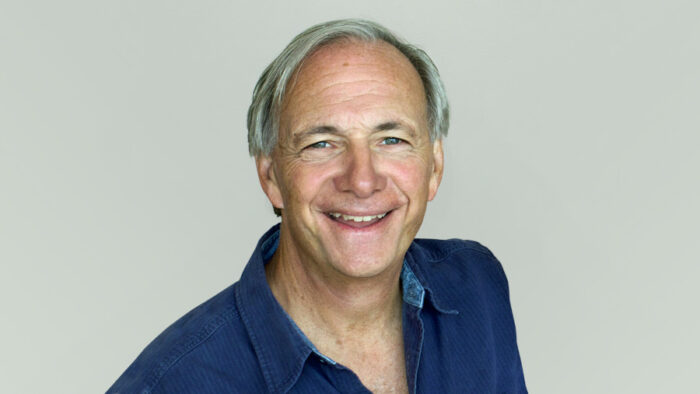สัปดาห์ที่ผ่านมา มีข่าวใหญ่ในแวดวงการเงินคือ Ray Dalio ผู้ก่อตั้ง Bridgewater Associates กองทุน hedge fund ที่ใหญ่ที่สุดในโลก ประกาศเกษียณอายุ
ผมเคยซื้อหนังสือ Principles ของ Ray มาอ่าน ก็พบว่าเข้าไม่ค่อยถึงนัก เลยอ่านไม่จบ (มีคนรู้สึกแบบเดียวกันเยอะเลย) เลยอาจไม่ใช่แฟนคลับของ Ray สักเท่าไร แต่ในแง่ของผลงานที่เขาสร้างกองทุนขนาดใหญ่ที่สุดของโลกก็เป็นที่ประจักษ์ว่ายิ่งใหญ่จริงๆ
มีบทความใน Bloomberg สองชิ้น พูดถึงบทบาทของ Ray และการเกษียณของเขา
ชิ้นแรกคือ Ray Dalio Closes the Frontier for Hedge Funds เขียนโดย Aaron Brown พูดถึงวงการ hedge fund ในภาพรวมในสองย่อหน้า ว่าเกิดจากผู้บุกเบิก 3 คน
George Soros founded the first of the great modern funds in 1970. Ten years later, Julian Robertson founded Tiger Management. Halfway in between, Ray Dalio opened Bridgewater Associates. Soros closed his fund to the public in 2011; Robertson died in August; and Ray Dalio just announced he is stepping back from Bridgewater.
These three pioneers still represent three stereotypes of hedge fund masters of the universe: Soros the bold gambler eager to play no-limit poker with governments and global financial institutions, trusting his backaches to warn him of danger, not his eyes or his brain; Robertson the great teacher, sending his Tiger cubs out to sort good companies from bad ones and build low-risk hedged portfolios; Dalio selling a process based on theory and quantitative methods that relied on diversification, not gambling, hedging or individual inspiration.
บทความชิ้นแรกพูดว่ายุคสมัยของ hedge fund แบบเดิมๆ ที่เป็นกองทุนที่รันโดยคนจำนวนไม่กี่คนนั้นจบลงแล้ว ในทางปฏิบัติ กองทุน hedge fund ก็ไม่ได้ต่างอะไรจากกองทุนทั่วไป (ปัจจุบัน Bridgewater มีพนักงาน 1,300 คน)
Most funds are run by investment professionals with standard resumes, not mavericks and refugees. The management companies employ armies of lawyers, accountants, computer personnel and others — a far cry from the lean organizations of analysts, traders and portfolio managers in the past.
บทความที่สอง Ray Dalio Gives Up Control of Bridgewater in Final Succession Step เขียนโดย Erik Schatzker พูดถึงการสืบทอดอำนาจของ Ray ว่าทำอย่างไร
ปัจจุบัน Ray อายุ 73 แล้ว เขาวางแผนเกษียณมาตั้งแต่ปี 2010 คิดว่าจะใช้เวลา 2 ปี แต่เอาจริงๆ ใช้ 12 ปี กว่าจะหาคนที่ใช่ได้พบ
He initiated a transition plan as far back as 2010, figuring it might take as little as two years. But Dalio struggled in his search for successors. Now that those people are in place, handing over control is the final and irreversible step.
การหาผู้สืบทอดของคนระดับ Ray ไม่ใช่เรื่องง่ายเลย ดังนั้นสูตรที่ออกมาจึงเป็นผู้สืบทอด 4 คน คือ co-CEO และ co-CIO (Chief Investment Officer) แต่กว่าจะลงตัวก็มีคนมาลองเป็น CEO/co-CEO กันไปแล้ว 7 คนใน 12 ปีที่ผ่านมา
It proved to be much harder than he expected. Over the following decade, seven different people at various times held the title of sole or co-CEO.
..3) a large team of people who have great character, great capabilities, and great devotion to Bridgewater who will support the co-CIOs and co-CEOs, (5/11)
— Ray Dalio (@RayDalio) October 4, 2022
แต่แค่เรื่องคนก็ยังไม่พอ เพราะต้องมีระบบที่ Ray วางเอาไว้เพื่อกำกับทิศทางด้วย ซึ่งระบบนั้นก็มีตั้งแต่บอร์ด (สมัยก่อน Bridgewater ไม่มีบอร์ด!)
When Dalio decided more than a decade ago to set Bridgewater’s succession in motion, “I was just running things,” he recalled. “We didn’t have a board or even an idea of how you establish good governance.”
..4) a great board that will oversee them to make sure they do a great job, and (6/11)
— Ray Dalio (@RayDalio) October 4, 2022
ถัดมาเป็นเรื่องของ culture ที่พยายามวางกันเอาไว้ แนวทางของ Ray คือคำว่า Idea Meritocracy ที่พยายามสร้างวัฒนธรรมให้คนมาถกเถียงเรื่อง “ไอเดียการลงทุน” อย่างตรงไปตรงมาที่สุด มีของแปลกๆ อย่างการทำการ์ดพนักงานเหมือนพวกการ์ดนักกีฬา ใส่ค่าคะแนนและคุณสมบัติแปะลงการ์ดไว้ให้คนอื่นรู้
The place certainly was unusual. Dalio wanted to create an “idea meritocracy” and believed the best way to achieve it was through “radical truthfulness and radical transparency.” Open disagreement was encouraged, so-called baseball cards rated employees on attributes such as believability, and meetings were recorded.
แต่วัฒนธรรมบางอย่างก็ไม่เวิร์ค และกลายเป็นข้อจำกัดให้พนักงานไม่กล้าพูดแทน จนต้องยกเลิกไป
Bridgewater came to realize that several of its methods were constraining creativity and collaboration rather than surfacing the best ideas, according to Jensen.
“The goal is to get people to speak their mind,” he said. “Some of those tools worked to pull out the truth and some of them didn’t.”
As a result, the baseball cards, for example, no longer try to capture and predict every characteristic and quality in the effort to rate an employee’s input.
..I'm deeply grateful for everything these people have done to bring us to this moment.While it hasn't been easy over the last 12 years, we made it! Over the last 2 yrs I have watched & mentored them so they could run Bridgewater w/out my interference and they did great. (8/11)
— Ray Dalio (@RayDalio) October 4, 2022
เคยสนทนากับพี่ที่เคารพบางท่านที่เป็น Founder/CEO ของบริษัทใหญ่ๆ ก็พบว่ามีปัญหาเรื่อง succession ในลักษณะเดียวกัน คือไม่สามารถหาคนมาแทนตัวเองได้ 100% จึงต้องออกมาท่าคล้ายๆ แบบนี้คือ แบ่งบทบาทให้คนหลายๆ คนมาช่วยกันทำ และหากลไกอื่นๆ มาช่วยกำกับทิศทางแทน
